Today, you’re going to learn how to stop being emotionally abusive and how to break the cycle of abuse using 10 powerful strategies.
Often emotional abuse is denied, or written off as simple conflicts when in fact the person abused is being severely damaged psychologically.
But emotional abuse doesn’t only hurt the person being abused, it also hurts the relationship as it infuses it with hostility, contempt, and hatred.
The abuser begins to lose sight of any valuable qualities the other person once had and loses respect for them.
Over time, anger can build up and turn to physical violence.
What Is Emotional Abuse?
When most people think of emotional abuse, they usually think of verbal abuse, such as criticizing, making harsh judgments, screaming, name-calling, etc.
But emotional abuse is much more than that.
Emotional abuse is defined as any nonphysical behavior or attitude that aims to control, demean, or punish another person.
Other than verbal abuse, emotional abuse may include:
- silent treatment,
- refusal to be pleased,
- withholding of attention or affection
- sulking and pouting
- disapproving or dismissive, looks, comments, or behavior
- subtle threats of abandonment (*) (*)
There are also some types of intimidating physical behavior that can be considered emotional abuse, such as:
- making threatening gestures or faces,
- slamming doors,
- throwing or destroying furniture, or other objects,
- kicking a wall,
- driving recklessly while the victim is in the car
Related: How To Break Free From Emotional Abuse? (& Stop Attracting Abusive Partners)
Are You Emotionally Abusive? 10 Signs You Are Emotionally Abusive
If being emotionally abused is difficult to admit, it is even more difficult to face the possibility that you might have been emotionally abusing someone else.
It is much easier to continue to justify or rationalize your behavior by telling yourself that your partner deserves the treatment you’ve given them or that they are pushing you too far.
If you want to stop being abusive, you need to stop making excuses and admit the truth, first to yourself and then to the other person being abused.
The following are some signs you might be emotionally abusive:
- You get involved in relationships where you maintain the dominant role in the relationship.
- You believe you have the right to make most decisions by yourself for the relationship.
- You insist on being in control of the money in the relationship.
- You insist that the other person does as you say.
- You give the other person the silent treatment or withhold approval when you don’t get your way.
- You threaten to leave the house or the relationship when they don’t do as you wish.
- You experience frequent mood shift going from loving to rejecting in a very short time.
- You become enraged so often.
- You secretly disrespect the other person because you feel they’re weak or inadequate.
- You think others are too sensitive. This is why they get hurt so often by the things you say or do. (*)
If you can relate to any of these signs, it may mean that you have been guilty of emotionally abusing your partner.
This doesn’t mean that you should be referred to as an “abuser.” We are all guilty of displaying emotionally abusive behaviors from time to time.
However, you need to make effort to stop this behavior now that you are aware of it.
Related: Healing From Childhood Emotional Neglect In 6 Steps (+FREE Worksheets PDF)
The Repetition Compulsion
If you are abusive in your relationships, chances are you’ve been abused as a child.
Repetition compulsion is an unconscious need to reenact the same type of abusive relationship you experienced as a child in an attempt to overcome it and accomplish a new outcome.
We’ve all heard the phrase—“he married his mother” or “she married her father.”
In an attempt to undo the past, the repetition compulsion compels us to transfer unmet needs, defense mechanisms, and conflicts from the past onto present relationships.
We relive the same story hoping that this time things will be different.
Unless and until we become aware of this unconscious process, we will keep repeating it over and over again.
Related: Childhood Emotional Neglect Test
What Causes A Person To Become Emotionally Abusive?
There are many factors that can contribute to a person becoming emotionally abusive. Some possible causes include:
1. Childhood or past trauma: If a person has experienced abuse or trauma in their past, they may be more likely to become emotionally abusive themselves.
2. Low self-esteem: A person with low self-esteem may feel the need to control and manipulate others to feel powerful and important.
3. Insecurity: An insecure person may be afraid of losing their partner or their position of power and may resort to emotional abuse as a way to maintain control.
4. Learned behavior: If a person grew up in an environment where emotional abuse was normalized or accepted, they may not recognize their behavior as abusive.
How To Stop Being Emotionally Abusive? Top 10 Tips On How To Break The Cycle Of Abuse
#1. Face Your Feelings of Shame and Guilt
As hard as this might be, without admitting the truth of your abusiveness, you won’t be able to change yourself or save the relationship.
Admitting your abusiveness is bound to trigger overwhelming feelings of guilt and even shame.
The difference between guilt and shame
We experience guilt when we realize that we’ve done something wrong, but when we make amends and apologize to the person we hurt, the guilt is resolved.
On the other hand, we experience shame when we believe that we are the mistake. This feeling is hard to resolve and may eat away at your self-esteem.
In other words, we feel guilty for what we do and we feel shame for what we are.
In reality guilt and shame usually overlap. You feel guilty for something you did, but you may also feel shame for being the kind of person who does such a thing.
Shame Serves a Purpose
We are often told that shame is an unhealthy emotion. But this is not always true.
Like all emotions, shame can be healthy and serve a purpose. It can be a sign that we are failing to be who we aspire to be.
Shame can help expose us to parts of ourselves that we have been reluctant to acknowledge and help us get to know ourselves on a very deep level. This is healthy shame.
Shame becomes unhealthy when it has no basis in reality.
Facing your abusiveness doesn’t mean that you are a failure as a partner or as a person. Rather, it means that your behavior has hurt your partner and that you need to take responsibility for this.
In this sense, shame helps you self-reflect and take necessary action to apologize and make amends.
Related: 10 Signs You Were Shamed In Childhood
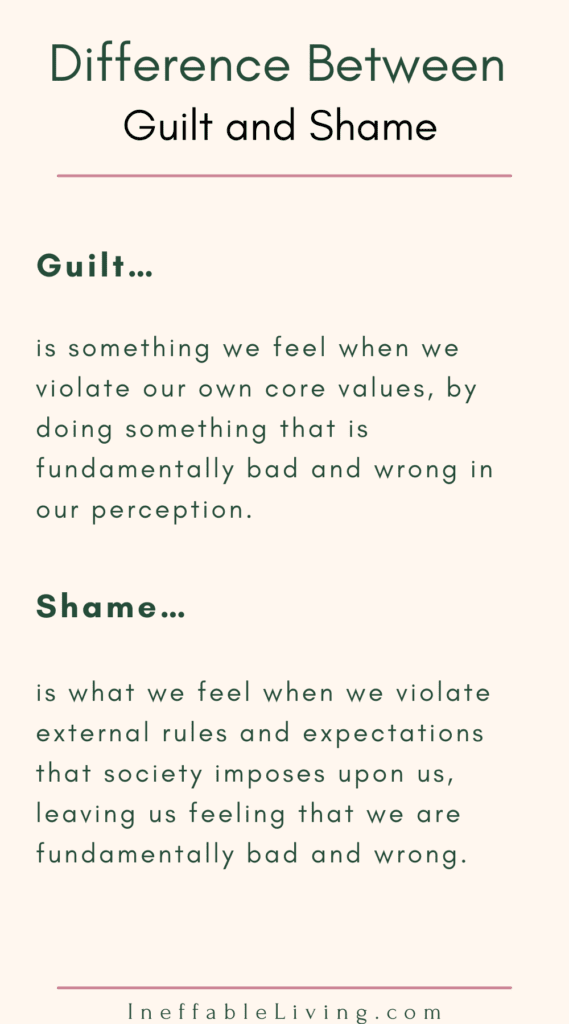
#2. Identify The Origins of Your Abuse
Sometimes, people who were emotionally abused in previous relationships become abusive in an attempt to avoid being victims.
They usually become aware enough to avoid getting involved with any abusive partners but instead, choose a partner who is unassertive or passive in order to guarantee they will never be abused again.
This is when their own abusiveness becomes activated.
But it’s not just emotional abuse that causes you to carry this damage forward into future relationships. physical and sexual abuse may also set you up to become emotionally abusive.

#3. Work on Your Unfinished Business From The Past
To change your patterns of abuse, you need to acknowledge your emotions of anger and pain that you felt as a result of the abuse you experienced as a child. (*)
It’s only when you resolve these feelings that you can put an end to your abusive behavior.
Accessing your anger
While you may have no difficulty expressing anger toward your partner, you may find it difficult to feel anger toward your original abuser.
It’s important to feel anger toward your abuser and recognize that what you’ve experienced was not okay before you can stop your own abusiveness.
Try this: think of incidents when one or both of your parents or other caretakers abused you and allow yourself to feel anger.
Access your pain
The next step is to move beyond your anger and connect to the sadness that lies underneath your anger.
Write down about what happened and how it hurt you.
If you are having difficulty allowing yourself to feel sadness, I encourage you to reach out for help.

Do You Need to Confront Your Abuser?
Forgiving and moving on can be especially difficult without confrontation, apology, or some kind of closure.
Although receiving an apology or an acknowledgment can be tremendously healing, it might be difficult to get one.
Forgiving and moving on don’t necessarily require confrontation. You can still do it symbolically by writing a letter that you don’t send, or role-playing.
Related: Stop Self-Sabotage: How to Tame Your Inner Teenager and Heal Your Inner Child?
#4. Develop Empathy For Those Who Hurt You
Once you access your anger, the next step is to understand how could a parent or a caretaker inflict such pain.
As you learn about your abuser’s background, you may discover that they, themselves were abused as children.
This can help you feel empathy for them.
Related: 12 Actionable Tips to Fix Lack of Empathy and Become a Strong Empath
#5. Admit Your Abusiveness to Your Partner
Admitting your abusiveness to your partner can be especially hard to do if you find admitting mistakes in general difficult.
Isn’t admitting it to yourself enough?
Admitting to your partner that you have been emotionally abusive can help you further come out of denial and take responsibility for your behavior.
When you admit your abusiveness to your partner, it will be hard to deny it or minimize the damage you’ve caused.
Also, this will help your partner understand that they had been emotionally abused, if they couldn’t put a name to what they are experiencing. It can also help them seek help for the damage inflicted and examine their own pattern that might have contributed to the dynamics of abuse in the relationship.
What to Say to Your Partner?
Whether you choose to do this in person or in writing, make sure you address the following points:
- Acknowledge that you have been emotionally abusive,
- Give specific examples of your abusive behavior
- Express regret and remorse and promise to work on changing
Make sure you don’t blame your partner and take full responsibility for your actions.
FREE Inner Child Exercises PDF
#6. Develop Empathy For Your Partner
This will help make the apology more sincere, but also ensure that you won’t abuse them in the future as you begin to see how damaging your abusive behavior has been.
Write about the abuse from your partner’s point of view:
- Start by imagining how your partner must have felt being treated in an abusive way.
- Think how the effects of your abusive behavior might have damaged their self-esteem and self-image.
If you find it difficult to understand how your abuse has affected your partner, try to ask them and listen no matter how difficult it is.
Related: How Do We Develop Empathy For Others? The 6 Habits of Highly Empathetic People
#7. Give A Meaningful Apology
A meaningful apology should include the following elements:
- A statement of regret— This includes acknowledgment of the damage you’ve caused and an expression of empathy.
- Acceptance of your responsibility— Make sure you don’t blame your partner and you accept the consequences of your actions.
- Willingness to remedy the situation— promise to work not changing and give them your plan of action that will help you achieve that (e.g., seeking therapy).
#8. Find Safe Ways to Release Your Anger
1. Recognize Healthy Anger
Most people think of anger as a negative emotion. But anger in and of itself is neither positive nor negative. It is what we do with anger that makes it positive or negative.
Anger can motivate us to stand up for ourselves, make a positive change in our lives. This is when anger is healthy and appropriate.
However, when we express anger in destructive ways, or when anger is irrational and excessive, it becomes negative.
Related: How To Manage Your Anger In Healthy, Effective Ways?
2. Become More Assertive
Identify the specific behavior that upsets you.
Pick up an appropriate time to discuss it with the other person.
Use the assertive model:
1. State the facts, “When you do…”
2. Express your feelings, “I feel hurt and angry.”
3. Identify the desired change, “I would prefer if you…”
Once you express your point of view, negotiate a resolution to the problem with the other person.
Related: How to Be More Effective in Relationships (Effective Communication)
3. Challenge Your Negative Beliefs
Unhealthy anger is often triggered by irrational or unrealistic expectations or beliefs that we have about ourselves and others, such as, “I must not make any mistake—otherwise I’m no good,” or, “Those that I associate must behave the way I want them to be—otherwise it’s catastrophic.”
Change these negative beliefs by giving up shoulds and musts and cultivate an attitude of acceptance. Rather than feeling enraged because someone has cut you off in traffic, don’t take it personally and simply acknowledge that people will do whatever they want.
Related: 10 Powerful Techniques To Control Your Negative Thoughts
4. Other Ways to Manage Anger
1. Use distractions such as counting to ten, repeating an affirmation to yourself, or leave the situation.
2. Reframe the situation. Rather than think that something is wrong with you for being treated poorly, consider that this person might be rude and is treating others based on the person he is.
3. Cultivate more compassion toward others in a way that enables you to see beyond the wrong they did.
4. Read books on anger management.
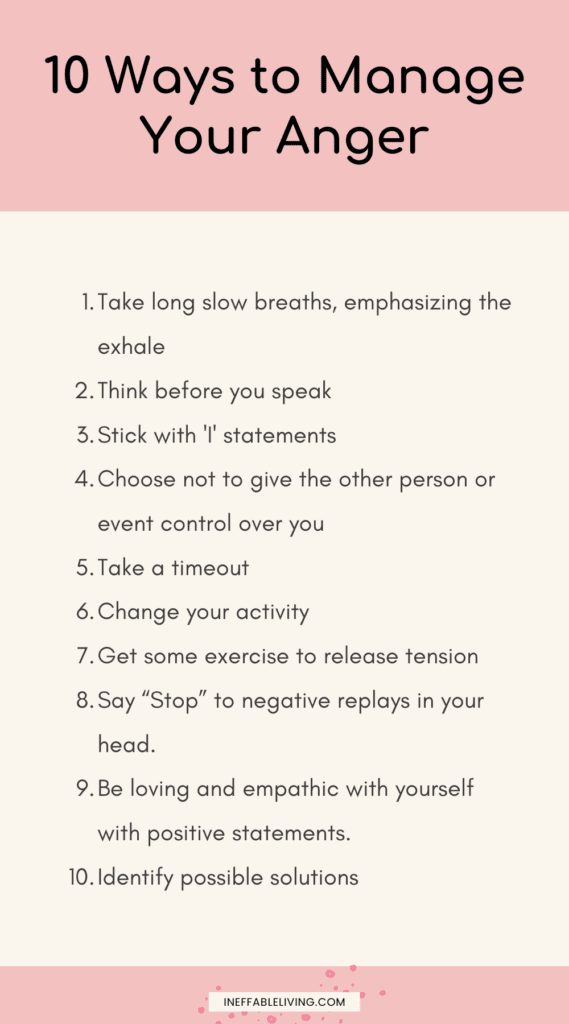
#9. Identify Your Triggers
Most people become abusive when triggered.
Triggers represent suppressed or repressed fears, insecurities, anger, or regrets that prompt involuntary and often intense emotional reactions when activated.
Identifying the specific situations, behaviors, or words that trigger your abusiveness can help you anticipate and manage them better.
The following are some common triggers for abuse:
- Feeling ignored or rejected, usually as a result of childhood neglect or abandonment
- Feelings of envy or jealousy, this may trigger memories of being a less-favored child
- Feelings of shame whenever others appear to be critical or rejecting of you, often as a result of being heavily shamed as children
In an attempt to fend off shame, envy, or feelings of rejection, you may act in an abusive way.
If you find it difficult to identify specific situations, behaviors, or words that trigger your abusiveness, it might be helpful to keep a log of each incident of emotional abuse.
#10. Address Specific Types of Abuse
1. Control
Most people who use control tend to feel out of control themselves.
Work on increasing your sense of self-control by focusing on the things you have control over (your thoughts and actions) and releasing the things you have no control over (other people’s feelings, thoughts, and actions)
2. Criticism
People who tend to focus on the other person’s mistakes and inadequacy become critical.
Take a few minutes every day to think about the good things your partner did and the good things that happened to you that day in general.
3. Possessiveness
It’s important to remind yourself that the more you try to hold your partner close to you, the more they will pull away.
Without freedom, we humans, begin to feel like a caged animal and we start resenting our partners.
Related: Am I Controlling In My Relationship Quiz
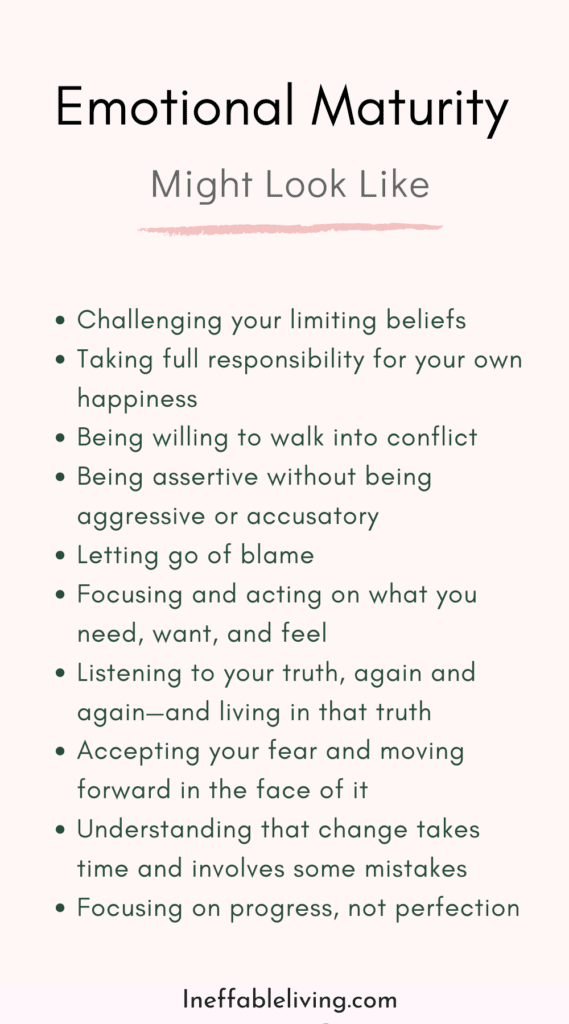
Healing Trauma Worksheets

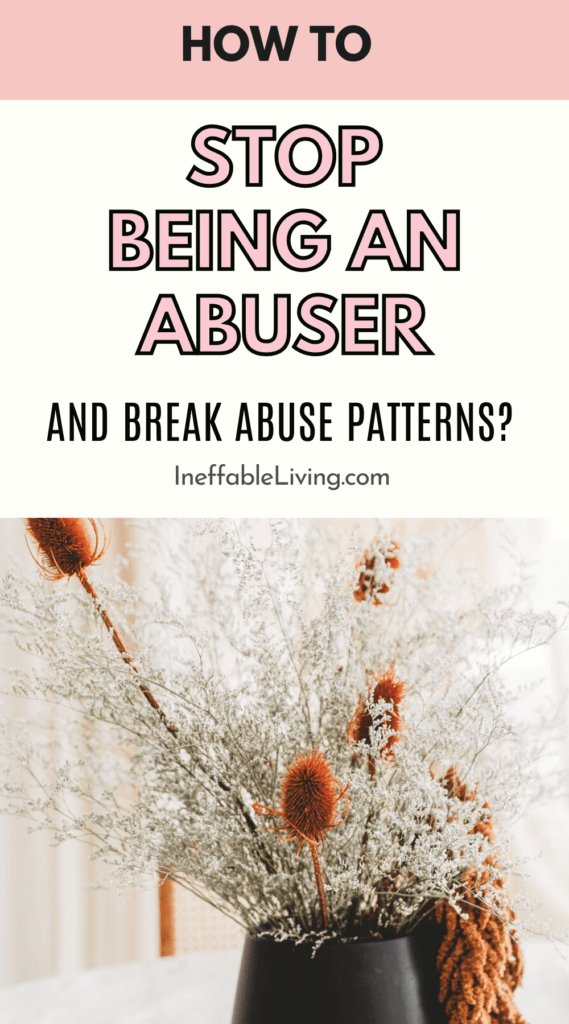
References
- Portions of this article were adapted from the book The Emotionally Abusive Relationship, © 2002 by Beverly Engel. Jantz. All rights reserved.
- The invisible scars of emotional abuse: a common and highly harmful form of childhood maltreatment | BMC Psychiatry | Full Text (biomedcentral.com)
- What Is Emotional Abuse? (verywellmind.com)
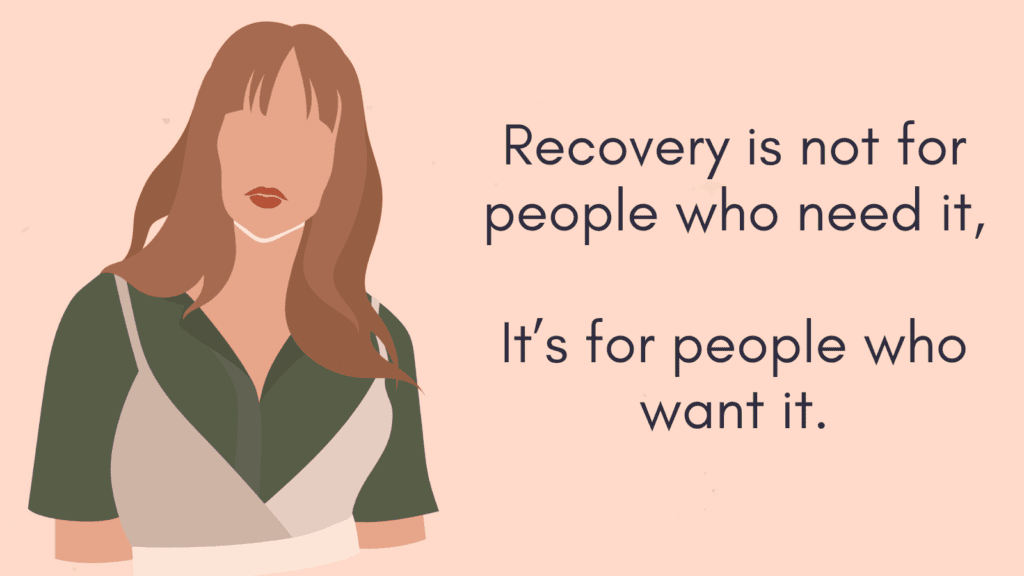

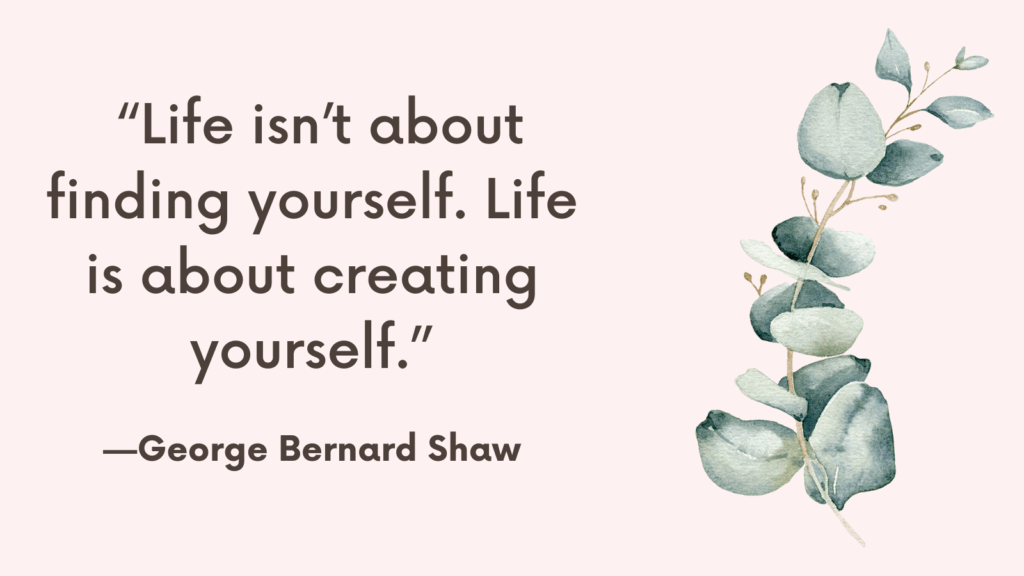
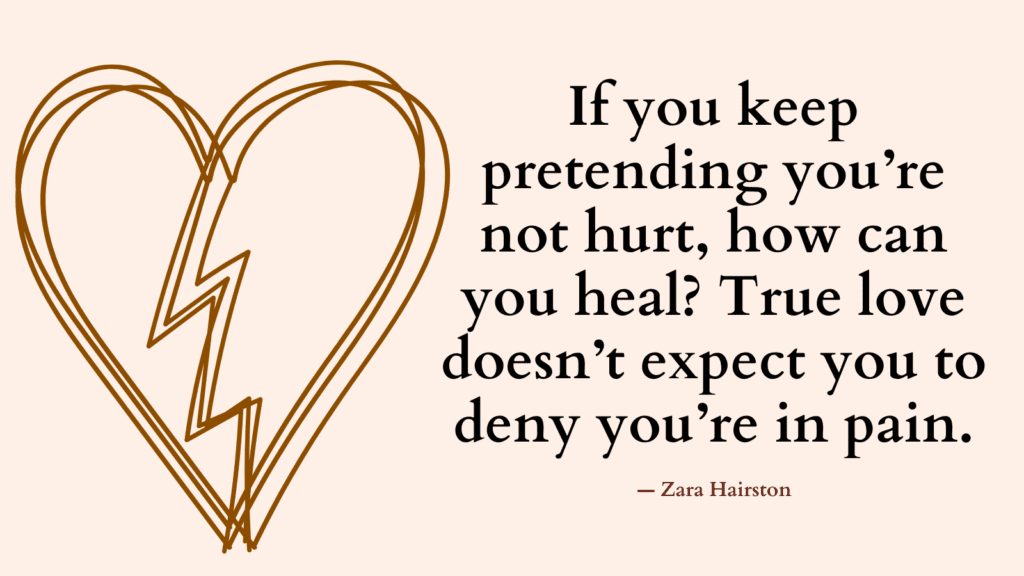
Comments are closed.